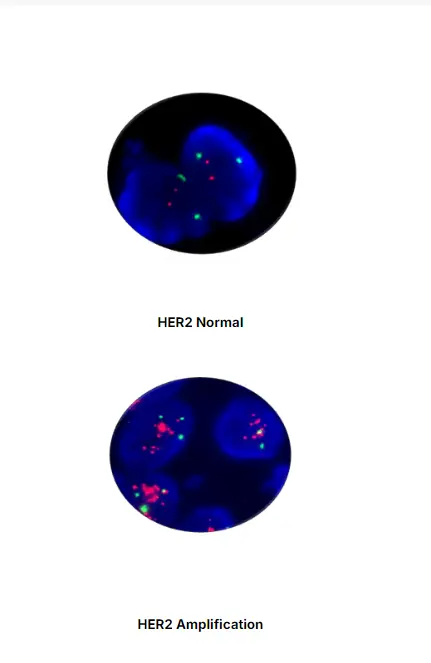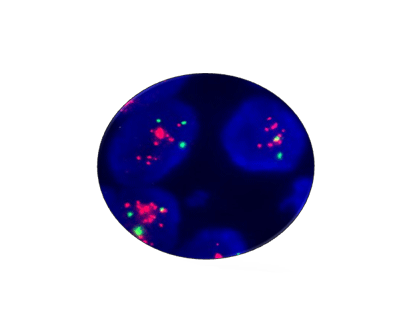HER2 Positive Cancer: Exploring Current Curative Options

By admin
HER2 positivity in cancer denotes a form of cancer that exhibits the presence of the human epidermal growth factor receptor 2 (HER2). This receptor plays a role in controlling cellular proliferation and division processes. When HER2 is excessively expressed it stimulates accelerated tumor development. Increases the risk of cancer spreading to other parts of the body. This particular characteristic is commonly observed in breast cancer cases. Can also manifest in various other forms of cancer such, as stomach cancer. HER2 positivity in tumors is notable, for their biological traits and the tailored treatment choices offered to address them.
How Do You Diagnose HER2 Positive Cancer?
Diagnosis of HER2 positive cancer involves a combination of clinical evaluations and laboratory tests. Initial assessments typically include imaging studies and biopsies to evaluate the tumor characteristics. Following these assessments, pathologists employ specific techniques to measure the presence of the HER2 protein or gene amplification in tumor samples.
Technologies and Tests
Technologies used for diagnosing HER2 positive cancer include immunohistochemistry (IHC) and fluorescence in situ hybridization (FISH). IHC tests detect the level of HER2 protein on the surface of cancer cells, helping classify the tumor as positive, negative, or equivocal. FISH, on the other hand, assesses the HER2 gene amplification by examining the genetic material within the cells. These tests, especially when used in tandem, provide a comprehensive view of the HER2 status, influencing treatment decisions for patients.
What Are the Current Treatment Options for HER2 Positive Cancer?
Treatment options for HER2 cancer have advanced greatly to provide holistic care tailored to this particular type of cancer. The main objective of treatment is to block the HER2 signaling pathway that plays a role, in tumor development. A diverse treatment strategy involving a combination of chemotherapy targeted therapies and immunotherapy is commonly utilized.
Chemotherapy
Chemotherapy continues to play a role in treating HER2 positive cancer cases that have progressed to advanced stages it works by attacking fast-growing cells which helps shrink tumors and boost patient outcomes in HER2 positive breast cancer combining chemotherapy with targeted treatments can improve the overall effectiveness of therapy and offer better results, against aggressive cancer cells.
Targeted Therapies
Targeted treatments are crucial in treating HER2 cancer by using medications like trastuzumab (Herceptin) and pertuzumab that specifically attach to the HER2 receptor to stop its signals and cause the death of cancer cells. The introduction of these treatments has transformed the management of the disease by offering efficient choices with reduced side effects when compared to standard chemotherapy methods. Combining targeted therapies with chemotherapy has proven to enhance the survival outcomes for individuals, with HER2 breast cancer.
Immunotherapy
Immunotherapy is a way of treating cancer by using the body’s immune system to fight against it effectively with treatments like monoclonal antibodies that tag cancer cells for removal by immune cells, in HER2 Positive cancers This method helps the immune system identify and eliminate HER2 Positive tumor cells. Better research is still ongoing to see how combining immunotherapy with current treatments can lead to better results.
Solutions
For those seeking further treatment solutions tailored to HER2 positive cancer, various resources are available. The collaboration with healthcare professionals who specialize in HER2 testing and treatment can significantly impact patient care and outcomes. Companies like Celnovte offer resources and specialized tools that aid in managing HER2 positive cases, ensuring that patients receive personalized and effective treatment strategies. Moreover, innovations such as the HER2 Gene Amplification Detection Kit enhance diagnostic accuracy, facilitating timely and appropriate therapeutic interventions.
In summary, dealing with HER2 cancer comes with its own set of difficulties but with the introduction of new diagnostic techniques and different treatment choices, there is a positive outlook for managing the condition effectively. Taking an approach involving chemotherapy, targeted treatments, and immunotherapy has proven to be beneficial, in enhancing the well-being of patients. As studies progress solutions will become more sophisticated bringing optimism to patients and enhancing their quality of life.
Are There Any New Developments in Treating HER2 Positive Cancer?
Lately, there have been improvements in treating HER2 cancer that have expanded the range of treatments accessible to patients. This progress involves targeted medications, new and improved combination therapies, and better diagnostic tools that can pinpoint patients who are most likely to respond well to particular treatments. For example, fresh monoclonal antibodies and small molecule inhibitors are currently being tested in trials to see how effective they are, in stopping HER2 signaling. This leads to the management of tumor growth.
In addition to that point mentioned earlier, continued studies are looking into the possibilities associated with antibody-drug combinations connecting chemotherapy medications to antibodies that go after HER2 is specifically targeted by this method of treatment which aims to transport substances straight to cancerous cells while sparing healthy tissues leading to fewer side effects and better reaction rates observed in patients undergoing such treatment approaches. Moreover, research focused on understanding the reasons for resistance, against HER2 therapies is crucial as it helps in designing strategies to combat this issue ensuring that individuals are provided with customized treatments based on the unique traits of their tumors.
Can HER2 Positive Cancer Be Cured?
The possibility of curing HER2 cancer depends significantly on various elements such as the stage of cancer at detection and the specific attributes of the tumor as well, as the success of the treatment strategy adopted by doctors. Many individuals diagnosed with stages of HER2 positive breast cancer are experiencing long-lasting improvements and extended life expectancy; however, achieving a complete “cure” necessitates thorough monitoring and assessment of treatment outcomes over an extended period.
Metastatic cancer that is HER2 positive poses a more intricate situation to deal with compared to other types of cancer cases we see today. While the existing treatments have proven to extend lifespan and sometimes even result in a full recovery for some patients the concept of what constitutes a complete cure is still changing and adapting over time. The continuous progress in medicine and targeted treatment approaches brings hope for reshaping the way we view HER2 positive cancer potentially turning it into a condition that can be managed over the long term rather than being seen as immediately life-threatening. By focusing on customizing treatment plans based on the makeup of the tumor and individual patient factors we are enhancing the chances of keeping the disease under control, for extended periods.
What Solutions Are Available?
The options for treating HER2 cancer are growing steadily over time which is a positive development for both patients and healthcare professionals alike! To ensure the best outcomes possible for treatment success healthcare providers suggest combining approaches such as targeted therapies, with chemotherapy and new innovative ways to manage the condition.
1. Targeted Therapies: Medications such as trastuzumab and neratinib continue to lead the field in HER2 targeted therapies. These agents work to inhibit the HER2 receptor itself. Many studies highlight the benefit of combining these targeted treatments with chemotherapy, aiming to improve overall patient outcomes significantly.
2. Chemotherapy Updates: The combination of chemotherapy drugs with various ways of working has shown to be advantageous, in medical treatment studies. They are also investigating the timing and order of treatments to improve effectiveness and decrease resistance while enhancing the treatment outcomes for HER2 positve cancers.
3. Immunotherapy Choices; The change in approach towards immunotherapy is a step forward in the treatment of HER2 positive cancers. By combining checkpoint inhibitors with standard treatments we can enhance the body’s natural defense mechanism, against cancer cells offering an extra layer of protection.
4. Diagnostic Innovations: Accurate diagnostic tools significantly influence treatment decisions and outcomes. For instance, companies like Celnovte are pivotal in offering advanced diagnostic kits and technology that facilitate the early detection of HER2 amplifications or overexpression, allowing for timely and targeted therapeutic interventions. The HER2 Gene Amplification Detection Kit is instrumental in ensuring patients receive the appropriate targeted therapies based on their unique tumor biology.
In summary, while challenges exist in treating HER2 positive cancer, ongoing research and advancements in therapeutic approaches offer hope for new solutions that could transform management strategies. Engaging with healthcare professionals knowledgeable about the evolving landscape of HER2 therapies ensures that patients are well-informed about their options. The integration of innovative diagnostic tools and personalized treatment plans will continue to drive recovery rates and improve the quality of life for those affected by HER2 positive cancer.
By staying informed about these solutions and collaborating with specialists, you can navigate the complexities of HER2 positive cancer more effectively, ultimately contributing to better health outcomes. For individuals seeking specific solutions for their condition, exploring resources like Celnovte’s Solutions can be a valuable step toward personalized care and improved clinical results.
RELATED PRODUCTS








